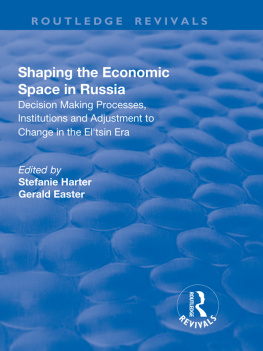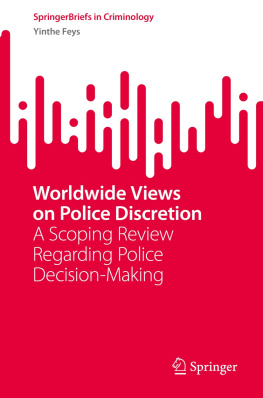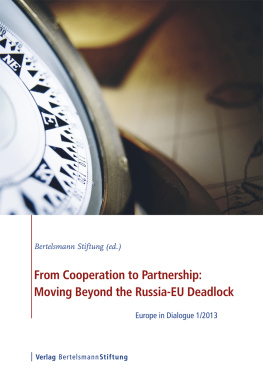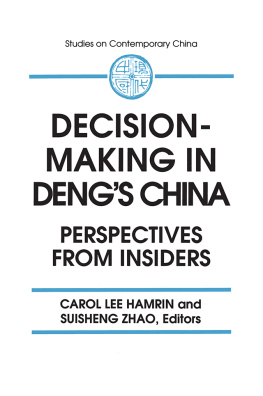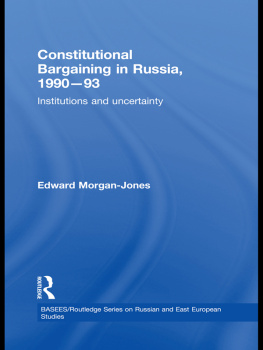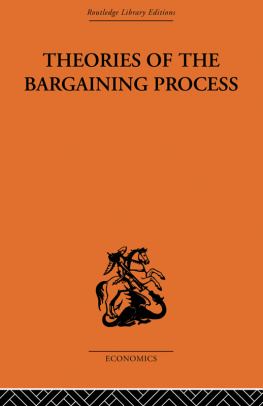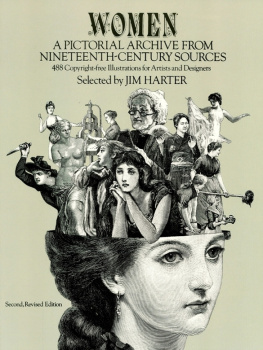SHAPING THE ECONOMIC SPACE IN RUSSIA
First published 2000 by Ashgate Publishing
Reissued 2018 by Routledge
2 Park Square, Milton Park, Abingdon, Oxon OX14 4RN
711 Third Avenue, New York, NY 10017, USA
Routledge is an imprint of the Taylor & Francis Group, an informa business
Copyright Stefanie Harter and Gerald Easter 2000
All rights reserved. No part of this book may be reprinted or reproduced or utilised in any form or by any electronic, mechanical, or other means, now known or hereafter invented, including photocopying and recording, or in any information storage or retrieval system, without permission in writing from the publishers.
Notice:
Product or corporate names may be trademarks or registered trademarks, and are used only for identification and explanation without intent to infringe.
Publishers Note
The publisher has gone to great lengths to ensure the quality of this reprint but points out that some imperfections in the original copies may be apparent.
Disclaimer
The publisher has made every effort to trace copyright holders and welcomes correspondence from those they have been unable to contact.
A Library of Congress record exists under LC control number: 00132802
ISBN 13: 978-1-138-72403-7 (hbk)
ISBN 13: 978-1-315-19270-3 (ebk)
Julian Cooper is Director of the Centre for Russian and East European Studies, University of Birmingham.
Tatyana Dolgopyatova is a Head of Department at the Higher School of Economics, Moscow.
Gerald Easter is Assistant Professor at the Department of Political Science, Boston College.
Vladimir Gelman is Lecturer in Russian Politics, European University of St. Petersburg.
Stefanie Harter is a Research Fellow at the Federal Institute for Russian, East European, and International Studies, Cologne.
Valery Kryukov is Head of Department at the Institute of Economics and Industrial Organisation, Siberian Department of the Russian Academy of Sciences, Novosibirsk.
Alena Ledeneva is Lecturer in Politics and Society, School of Slavonic and East European Studies, University of London.
Nicolai Petro is Professor at the Department of Political Sciences, University of Rhode Island.
Heiko Pleines is a Research Fellow at the Federal Institute for Russian, East European, and International Studies, Cologne.
Richard Sakwa is Professor at the Department of Politics and International Relations, Rutherford College, The University of Kent at Canterbury.
Hans-Henning Schrder is Senior Research Fellow at the Federal Institute for Russian, East European, and International Studies, Cologne.
Douglas Sutherland is Economist at the Organisation for Economic Cooperation and Development, Paris.
Melanie Tatur is Professor of Sociology at the Department for International Relations, University of Frankfurt.
Patrick Taylor is a PhD student at the Buckinghamshire Business School, Buckinghamshire Chilterns University College.
William Tompson is Lecturer at the Department of Politics and Sociology, Birkbeck College, University of London.
Alexander Trunk is Professor of Law at the Institute for East European Law, Christian Albrecht University, Kiel.
Shaping the Economic Space in Russia originated as a workshop hosted by the Bundesinstitut fr ostwissenschaftliche und internationale Studien in Cologne. Meeting for three days, from May 26 to 28, 1999, the institute assembled a team of international scholars to assess the changing patterns of economic behaviour and policy-making that have emerged in Russias transition economy. In this regard, the workshop had two specific objectives: first, to provide a wide array of disciplinary perspectives on economic developments over the past decade; and, second, to identify and explain the enduring institutional and cultural features that have shaped the Russian transition. The participants presented empirical research findings and debated the theoretical implications. With a group whose expertise ranged across economics, politics, society, culture and history, the discussions were consistently lively and intellectually engaging, though not always consensual. Besides those participants whose papers are presented in this volume, the workshop was further enriched by the contributions of additional participants: Michael Brie, Aleksandr Chepurenko, Barbara Christophe, Martin Fincke, Andreas Heinrich, Hans-Hermann Hhmann, Andrei Kuxenko, David Lane, Samuel Levinson, Silvana Malle, Margarete Mommsen, Simone Schwanitz, Wolfram Schrettl, Olga Senatova, Elke Siehl, Mark Urnov, and Kirsten Westphal.
Several individuals must also be commended for the effort and skill they displayed in the production of this book. Erica Richardson has not only proof-read the chapters but also adjusted the non-native contributions to English-language standards. Heiko Pleines deserves special thanks for assisting with translating parts of the Russian chapters and tracking obscure-looking references. Hans-Henning Schrder and Jrn Grvingholt have provided technical help. Without the support of Barbara Langer and Elke Hickmann, many organisational problems would have remained unsolved. Finally, we appreciate the financial support of the Volkswagen Foundation and the Bundesinstitut, whose founding allowed the conveyance of the event and the subsequent publication of the conference papers. Our thanks goes to all of them.
Stefanie Harter
Gerald Easter
GERALD EASTER & STEFANIE HARTER
The Eltsin Era opened with a surge of unbridled optimism. When Eltsin descended from atop the tank in the August 1991 putsch, it seemed that Russia had somehow shed its Soviet shell and had emerged rejuvenated into a post-Cold War world. Expectations were raised that Russia would become a partner to the West in world affairs and would undertake the building of the institutions of democracy and capitalism at home. This early optimism however, soon gave way to more cautious reserve, and was followed by cynicism and doubt.
After eight years of transition, Russia has yet to enjoy a revival of economic growth. While economic reform has stimulated the rise of new businesses, especially in consumer goods and services, the Russian economy has continued to contract since the collapse of the Soviet Union. In the summer of 1998, Russias transition came to a crashing halt with the fiscal collapse of the state. The government defaulted on its domestic and foreign debts and devalued the currency. Despite its abundant natural resources, industrial base and educated population, the Russian economy remains small in comparison with other countries. At the beginning of 1999, the Gross Domestic Product of Russia was estimated at $240 billion, comparable to that of the Netherlands.
As the Eltsin Era has now drawn to a close, numerous questions remain unanswered regarding the course of Russias post-communist transition. Eltsins exit from the presidential stage provides an appropriate opportunity to assess the achievements of Russias multi-faceted reforms, to explain the factors that have most shaped the reform process, and to identify the trends that are likely to continue under a presidential successor. The present volume embodies such an effort. Its contents are the product of a conference held in May 1999 at the Federal Institute for East European and International Studies in Cologne, Germany. The institute convened an international group of scholars, representing a variety of academic approaches to the study of transition economies in general, and Russia, in particular. The overarching theme of the conference was Shaping the Economic Space in Russia: Decision Making Processes, Institutions and Adjustment to Change. The goal was to determine the extent to which pre-existing structures and norms of economic and political life have been fundamentally altered by the Eltsin administrations reform campaigns and how these factors themselves have influenced the reform process.

